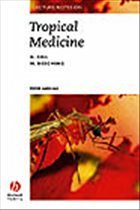Lecture Notes on Tropical Medicine is a core text with an emphasis on the clinical aspects of problem-solving in the tropics. This new, revised edition includes a more global and syndromic approach to tropical medicine.
Section A covers clinical presentations according to body systems and syndromic approaches, so that the reader can go straight to the relevant section for clues to the likely diagnosis. Section B gives core knowledge & clinical advice on the major tropical infections such as malaria and leprosy. The final section covers other serious tropical diseases, grouped by main body system of presentation, which includes cholera, hepatitis and scabies amongst others.
Additionally, this edition includes new chapters that broaden the traditional scope of 'tropical medicine'. These include a chapter on HIV & Aids which reflects the impact that these have had on the tropics, a chapter on non-communicable diseases and their management, as well as a new chapter on refugee health that covers humanitarian emergencies, control of epidemics as well as health assessment of asylum seekers. As always, carefully selected colour plates and an increased number of illustrations, effectively portray clinical conditions.
This fifth edition of Lecture Notes on Tropical Medicine is a very practical companion for the increasing number of medical students and junior doctors who have the opportunity to practice medicine in the tropics. It is also a key resource for clinicians who see patients with `tropical' disorders.
Contents
1: A General Approach to Syndromes/Symptom Complexes
1 Gastrointestinal presentations
2 Respiratory presentations
3 Neurological presentations
4 Febrile Presentations
5 Dermatological presentations
6 The patient with anaemia
7 A syndromic approach to sexually transmitted infections
8 Splenomegaly in the Tropics
2: Major Tropical Infections
9 Malaria
10 Visceral Leishmaniasis
11 Cutaneous Leishmaniasis
12 Tuberculosis
13 HIV infection and disease in the Tropics
14 Filariasis and Onchocerciasis
15 African Trypanosomiasis
16 South American Trypanosomiasis (Chagas' Disease)
17 Schistosomiasis
18 Leprosy
3: Other Tropical Diseases
Gastrointestinal:
19 Amoebiasis
20 Bacillary Dysentry
21 Cholera
22 Giardiasis
23 Intestinal Cestode Infections (Tapeworms)
24 Soil-transmitted helminths
25 Viral Hepatitis
26 Liver flukes
27 Hydatid disease
Respiratory:
28 Pneumonia
29 Lung flukes
30 Tropical Pulmonary eosinophilia
Neurological:
31 Pyogenic Meningitis
32 Cryptococcal Meningitis
33 Encephalitis
34 Acute flaccid paralysis
35 Spastic paralysis
36 Rabies
37 Tetanus
Fever:
38 Brucellosis
39 Typhoid and Paratyphoid Fevers
40 Arboviruses
41 Viral Haemorrhagic Fevers
42 Dengue and Yellow Fever
43 Relapsing Fevers
44 Rickettsia
45 Leptospirosis
46 Melioidosis
Miscellaneous:
47 Tropical Ulcer
48 Buruli Ulcer
49 Myiasis
50 Cutaneous Larva Migrans
51 Scabies and Lice
52 Strongyloides stercoralis
53 Guinea worm infection (Dracunculiasis)
54 Histoplasmosis
55 Other Fungal Infections
56 Haemoglobinopathies and Red Cell Enzymopathies
57 Haematinic Deficiences
58 Bites and Stings
59 Non-Communicable Diseases
60 Refugee Health
Section A covers clinical presentations according to body systems and syndromic approaches, so that the reader can go straight to the relevant section for clues to the likely diagnosis. Section B gives core knowledge & clinical advice on the major tropical infections such as malaria and leprosy. The final section covers other serious tropical diseases, grouped by main body system of presentation, which includes cholera, hepatitis and scabies amongst others.
Additionally, this edition includes new chapters that broaden the traditional scope of 'tropical medicine'. These include a chapter on HIV & Aids which reflects the impact that these have had on the tropics, a chapter on non-communicable diseases and their management, as well as a new chapter on refugee health that covers humanitarian emergencies, control of epidemics as well as health assessment of asylum seekers. As always, carefully selected colour plates and an increased number of illustrations, effectively portray clinical conditions.
This fifth edition of Lecture Notes on Tropical Medicine is a very practical companion for the increasing number of medical students and junior doctors who have the opportunity to practice medicine in the tropics. It is also a key resource for clinicians who see patients with `tropical' disorders.
Contents
1: A General Approach to Syndromes/Symptom Complexes
1 Gastrointestinal presentations
2 Respiratory presentations
3 Neurological presentations
4 Febrile Presentations
5 Dermatological presentations
6 The patient with anaemia
7 A syndromic approach to sexually transmitted infections
8 Splenomegaly in the Tropics
2: Major Tropical Infections
9 Malaria
10 Visceral Leishmaniasis
11 Cutaneous Leishmaniasis
12 Tuberculosis
13 HIV infection and disease in the Tropics
14 Filariasis and Onchocerciasis
15 African Trypanosomiasis
16 South American Trypanosomiasis (Chagas' Disease)
17 Schistosomiasis
18 Leprosy
3: Other Tropical Diseases
Gastrointestinal:
19 Amoebiasis
20 Bacillary Dysentry
21 Cholera
22 Giardiasis
23 Intestinal Cestode Infections (Tapeworms)
24 Soil-transmitted helminths
25 Viral Hepatitis
26 Liver flukes
27 Hydatid disease
Respiratory:
28 Pneumonia
29 Lung flukes
30 Tropical Pulmonary eosinophilia
Neurological:
31 Pyogenic Meningitis
32 Cryptococcal Meningitis
33 Encephalitis
34 Acute flaccid paralysis
35 Spastic paralysis
36 Rabies
37 Tetanus
Fever:
38 Brucellosis
39 Typhoid and Paratyphoid Fevers
40 Arboviruses
41 Viral Haemorrhagic Fevers
42 Dengue and Yellow Fever
43 Relapsing Fevers
44 Rickettsia
45 Leptospirosis
46 Melioidosis
Miscellaneous:
47 Tropical Ulcer
48 Buruli Ulcer
49 Myiasis
50 Cutaneous Larva Migrans
51 Scabies and Lice
52 Strongyloides stercoralis
53 Guinea worm infection (Dracunculiasis)
54 Histoplasmosis
55 Other Fungal Infections
56 Haemoglobinopathies and Red Cell Enzymopathies
57 Haematinic Deficiences
58 Bites and Stings
59 Non-Communicable Diseases
60 Refugee Health

